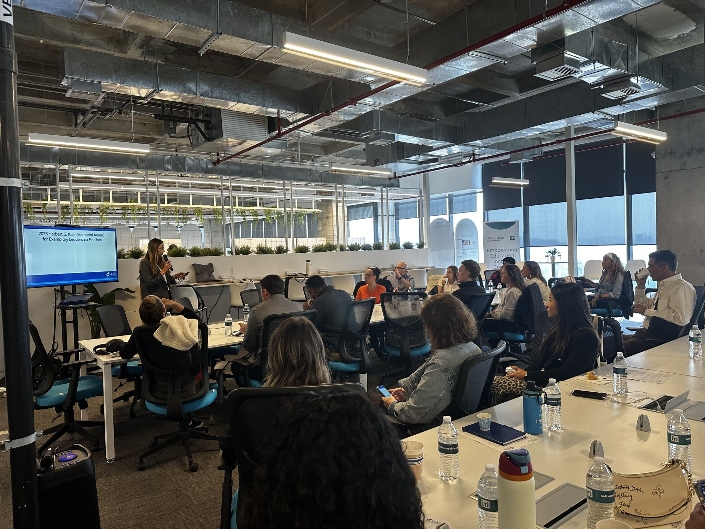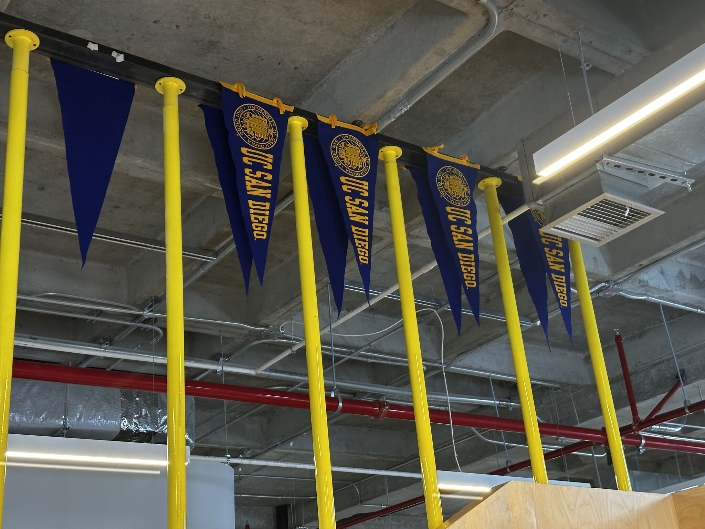Bridging Borders: UC San Diego and ITJ Forge a Binational Innovation Hub in Tijuana
Media contact:
Published Date
Article Content
Tijuana has long been recognized as an important hub of manufacturing and production in the San Diego-Tijuana binational region. Yet lately, there have been some entrepreneurs and innovators working to build Tijuana's reputation as a key player in other aspects of biotech and life sciences as well.
One such player is Tijuana software and technology company, ITJ.
Founded in 2019 by former Thermo Fisher Scientific technology director Maritza Díaz, ITJ is looking to leverage the strength of the San Diego-Tijuana binational region by blending U.S. innovation with Mexican talent.
“When you think about ITJ, we’re not in the business of doing technology or software. We’re actually in the business of developing people,” said Díaz. ITJ, she notes, is “helping provide the jobs of the future for young, talented people that, for one reason or another, have been overlooked for years.”

To further this mission, ITJ sought out the UC San Diego Division of Extended Studies as a strategic partner to help train and uplift local talent to meet the needs of U.S.-based and binational companies. Almost immediately, a partnership evolved that went from conceptual discussions to tangible initiatives in its first year.
The collaboration has already begun reshaping how the San Diego-Tijuana region thinks about workforce development, cross-border collaboration, and the future of tech education.
A shared vision for regional growth
From the beginning of the partnership, it became clear that UC San Diego and ITJ shared a vision to address the talent and innovation challenges of a rapidly growing binational economy.
"San Diego has a shortage of engineers, and no single university can solve that alone," said Morgan Appel, Assistant Dean for Education and Community Outreach at UC San Diego Division of Extended Studies. "With ITJ, we saw right away how they—and companies like them—could help fill that gap."
"In Mexico, there is a strong pool of software engineering talent, but few companies specialize in research and development for medical device software and technology. That's where we saw the opportunity," said Gabriela Gutiérrez, Marketing Director at ITJ. "Traditionally, Mexico has been seen more for medical device manufacturing, so its potential as a center for software engineering and life sciences innovation has yet to be fully tapped."
Tellingly, when Diaz was choosing the location for the ITJ home office, she chose Tijuana over larger Mexican metropolitan areas like Mexico City or Monterrey specifically because of the talent and cross-border opportunities that existed there.
The partnership that emerged quickly focused on providing ITJ with educational resources to better meet the needs of its U.S.-based clients.
"It's a very symbiotic relationship," Appel added. "The team at ITJ identifies the needs they have in serving their U.S.-based clients, and we co-create programming that directly addresses them. It’s not just about delivering content—it's about building something together that addresses the whole region's economic and innovation challenges.">
This symbiosis is felt by the team at ITJ as well.
"The main value, as I see it, is to grow our community across the San Diego-Tijuana region, creating a union between both countries and cities," said Adriana Cardenas, Quality and Security Compliance Manager at ITJ. "It's about sharing knowledge, building talent, and connecting our regions in ways that help everyone."
Building the partnership: education, leadership, and community
Since the UC San Diego-ITJ collaboration began in April 2024, several important steps have already been taken.
It's a very symbiotic relationship. The team at ITJ identifies the needs they have in serving their U.S.-based clients, and we co-create programming that directly addresses them. It’s not just about delivering content—it's about building something together that addresses the whole region's economic and innovation challenges."

Leadership development has been a core focus, with ITJ employees and partners receiving training in emotional intelligence, communication, and strategic decision-making—all designed to align with the needs of the U.S.-based biotech and life sciences companies ITJ serves.
"They have incredible talent and many of them are still in the early stages of their careers," said Appel. "UC San Diego and ITJ both recognized that they could greatly benefit from leadership development as an initial step into management roles."

The Leadership Academy, as it came to be called, is now entering its fourth cohort. From ITJ's perspective, it has filled a critical gap that enables them to better adapt to the management styles of U.S. businesses.
"It's not just about hard skills—it's about aligning with how business is done in the U.S.," said Gutiérrez. "When working with U.S.-based companies, it's essential to understand their communication styles, decision-making speed, ownership expectations, and approach to feedback. That's what UC San Diego helped us bring to our leadership team."
Beyond leadership, the partnership has also expanded into technical upskilling to fill gaps in needed proficiencies. Impacting 200 ITJ employees so far, this training has included specialized courses and workshops on topics such as Python programming, cybersecurity, and bioinformatics, totaling more than 125 hours.
"We started with very specific courses based on immediate needs," said Cardenas. "The idea was to give ITJ employees knowledge they can apply to life sciences work right away.”
In addition to formal training, the collaboration has also facilitated community events, such as "tech talks" and bootcamps on topics like artificial intelligence and software development, that are open to the public. These events not only strengthen ITJ employees' skills but also foster a broader network of innovators across the region.
A new biotech ecosystem in the making
Beyond new programs and education, the UC San Diego-ITJ partnership also represents a new approach to higher education's role in regional development.
"Traditionally, education happens first, and industry gets brought in later to approve it," Appel explained. "What we're doing is different. We are co-creating with industry from the start, listening to their needs, and designing programming together."
This collaboration benefits students and companies and has broader implications for equity and economic mobility throughout the San Diego-Tijuana cross-border region.
The partnership with UC San Diego, notes Díaz, is critical to preparing and presenting a skilled talent pool that industry partners can trust.
She notes that UC San Diego brings "not only the reputation and the name, but also the amazing skills in all the STEM-related topics…expertise that's allowing us to round out our engineers.”
Efforts are underway to involve local schools, community organizations, and other universities on both sides of the border to create a sustainable ecosystem of opportunity, from primary education to career development.
"We realized if we're serious about creating new talent pipelines, we can't just start at college," Appel said. "We have to start early—with sixth graders and even younger—providing them pathways into STEAM careers."
The initiative also plans to invite more partners to contribute to what Appel calls a "tapestry of support" for the emerging Tijuana biotech ecosystem. The goal is to provide a wide range of pathways for students and professionals alike to learn new skills and build the network of support Tijuana needs to grow into a more dynamic innovation hub.
"It's about building a stronger community from the inside out," Cardenas said. "We want to create more opportunities, more training, more knowledge-sharing, and keep strengthening the bridge between Tijuana and San Diego."
It's not just about hard skills—it's about aligning with how business is done in the U.S. When working with U.S.-based companies, it's essential to understand their communication styles, decision-making speed, ownership expectations, and approach to feedback. That's what UC San Diego helped us bring to our leadership team.
Future directions: a regional model for innovation
As the UC San Diego–ITJ collaboration continues to evolve, Appel sees the work as very much aligned with the UC San Diego mission.
"As a public university and a land grant institution, we have a responsibility and a privilege to serve not just our enrolled students, but our entire community—and our definition of community has grown. If we do this right, we don't just build a stronger workforce. We will build a stronger region."
The partners at ITJ see the bigger picture of the collaboration as well.
“In the last six years, ITJ has already provided jobs to more than 1,200 engineers…all in Tijuana, in Mexico,” said Díaz. "If they were to stay in the same jobs as the past, it would take them years to get to where they are today. And, today is just the beginning.
With a shared commitment to equity, innovation, and community-centered growth, the collaboration is already proving that borders are no match for shared purpose.
"This is about more than one company or one university," Cardenas said. "This is about building something bigger—a future where talent flows freely, where innovation knows no borders, and where everyone has the opportunity to succeed."
To learn more about UC San Diego community initiatives, visit the Education and Community Outreach page. Learn more about ITJ by visiting their website.
Share This:
You May Also Like
How Climate Policies that Incentivize and Penalize Can Drive the Clean Energy Transition
Politics & SocietyStay in the Know
Keep up with all the latest from UC San Diego. Subscribe to the newsletter today.



